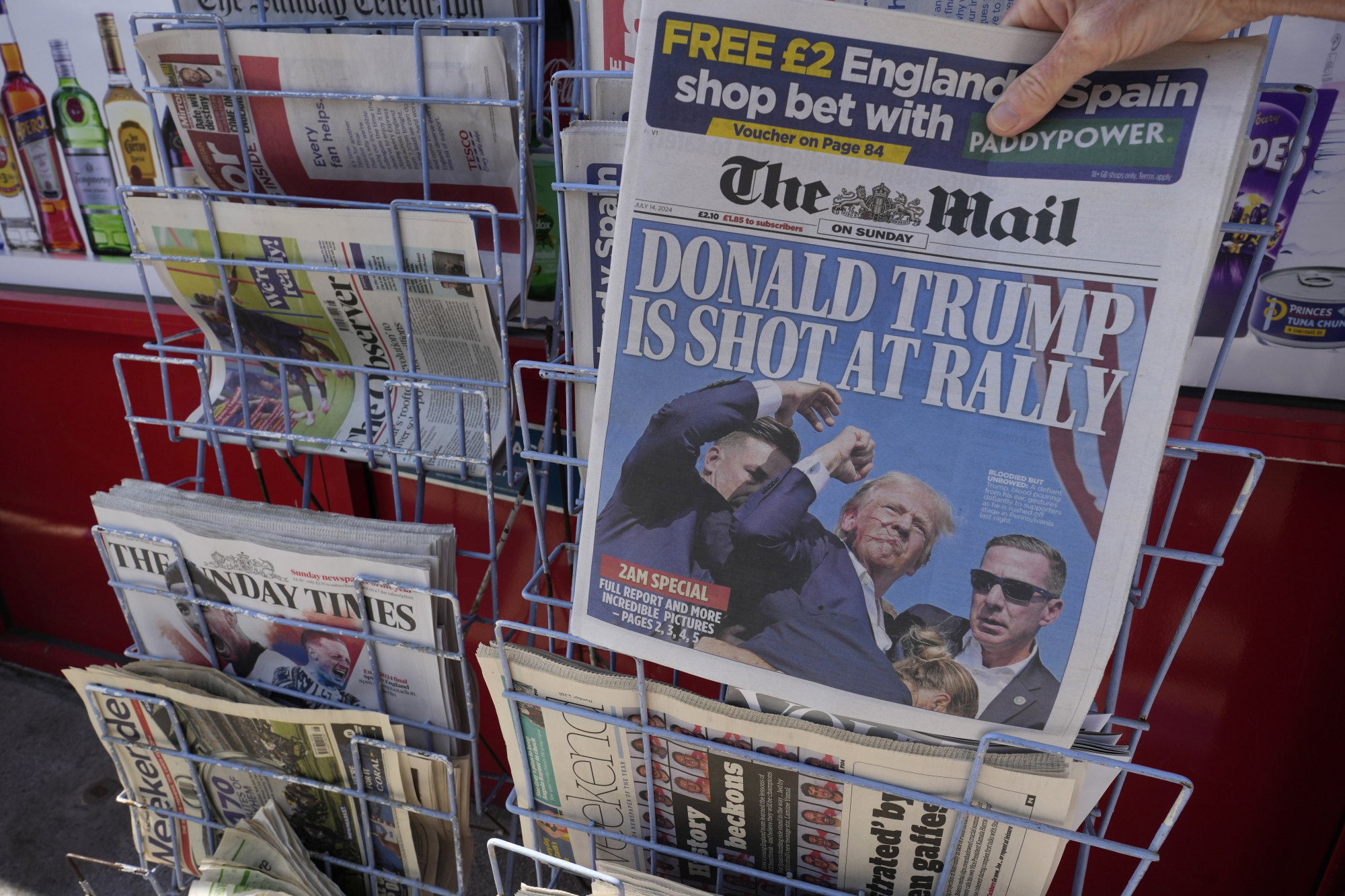The gunman who left Trump bleeding and killed one person was identified by the FBI in the early hours of Sunday as Thomas Matthew Crooks, a 20-year-old from a suburb of Pittsburgh – a little more than an hour’s drive from Butler. But officials released no additional information about him.
Hours after the shooting, Trump stepped off his plane in New Jersey early on Sunday morning in his first public appearance after he was shot in the ear.
He said on his Truth Social social media platform that he was looking forward to speaking from Wisconsin, where the three-day Republican National Convention will be held, starting on Monday.
“In this moment, it is more important than ever that we stand united and show our true character as Americans, remaining strong and determined,” he wrote.
However, angry messaging from many within his party suggested that such comity might be short lived.
Even before the authorities had given the identity of the shooter, demands were pouring in from Republicans for an immediate investigation.
The House Committee on Oversight and Accountability said late on Saturday that it would investigate the attempted assassination. Representative James Comer, a Kentucky Republican and chairman of the panel, asked Kimberly Cheatle, the director of the Secret Service, to testify at a hearing on July 22.
Cheatle was among those who briefed Biden soon after the shooting, along with Homeland Security Secretary Alejandro Mayorkas.
And whatever investigations are launched, the tone of those inquiries has already been made clear.
“The central premise of the Biden campaign is that president Donald Trump is an authoritarian fascist who must be stopped at all costs,” Ohio Senator JD Vance, who is on Trump’s vice-presidential shortlist, said on X, formerly Twitter. “That rhetoric led directly to president Trump’s attempted assassination.”
Georgia Representative Mike Collins called on Richard Goldinger, Butler county’s Republican district attorney, to “immediately file charges against Joseph R Biden for inciting an assassination”.
US House Speaker Mike Johnson said the Congress “will conduct a full investigation of the tragedy to determine where there were lapses in security”.
Speaking on NBC News on Sunday morning, the top-ranking Republican said it was time to “turn the rhetoric down”.
“We’ve got to turn the temperature down in this country. We need leaders of all parties on both sides to call that out and make sure that happens so that we can go forward and maintain our free society that we all are blessed to have,” Johnson said.
However, Florida Senator Rick Scott, another Republican, was more strident.
He said the Senate Committee on Homeland Security and Governmental Affairs (HSGAC), of which he is a member, “has an oversight responsibility and an obligation to the American people to demand answers from [the Department of Homeland Security] and the US Secret Service on how this happened and what steps are being taken to investigate this assassination attempt”.
Scott, who also sits on the Senate Foreign Relations Committee, also suggested that a quick effort to find these answers would mitigate the damage the assassination attempt had done to America’s image.
“Chairman Gary Peters must immediately hold a HSGAC hearing, before August 1, with testimony from these agencies and deliver the answers that we as US senators and the American people demand and deserve from our government,” Scott said. “The security of our republic is being questioned and we as a nation need answers.”
By late Saturday, some analysts were already weighing about exactly this concern.
Casey Burgat, director of the legislative affairs programme at George Washington University in the US capital, said the assassination attempt would have a significant impact on the US election and the global perception of American stability.
“Domestically, this event is likely to deepen partisan divides and intensify political tensions, all at a time when the partisan tensions are already at a boiling point,” Burgat said.
“Internationally, the attack raises serious concerns about the safety and security of political figures in the US, potentially undermining confidence in the country’s stability and democratic processes.”

Rob Casey, a senior analyst at political strategy firm Signum Global Advisors, said the incident might increase Trump’s support by highlighting his vigour, motivating his base, as well as eliciting a “sympathy” polling bump – but it might be short-lived.
He pointed to former president Ronald Reagan, who survived an assassination attempt in 1981 and saw his polling approval rate surged briefly.
“The incident is also likely to benefit President Biden by shifting some of the focus away from concerns around his age and acuity, removing pressure on him to leave the race and potentially further entrenching him in his desire to see the campaign through,” Casey said.
In the meantime, the Secret Service pushed back against rumours that it rebuffed requests from Trump’s team for extra security resources.
“This is absolutely false. In fact, we added protective resources, technology and capabilities as part of the increased campaign travel tempo,” Anthony Guglielmi, the service’s communications chief, said on X on Sunday morning.
Terry Haines, founder of Washington consultancy Pangaea Policy, said the shooting significantly heightened geopolitical risk and US political instability.
He said the global financial market “already expected increased US political instability thanks to polarised politics and the upcoming election. Those concerns just ratcheted up significantly tonight.”
“US political leaders of all stripes must show that perception is overblown and inaccurate,” he said. “But, in view of those politicians’ inability to be rhetorically responsible, demonstrating the humility necessary to lower the temperature isn’t a sure thing.”

.jpg&h=630&w=1200&q=75&v=20170226&c=1&w=350&resize=350,250&ssl=1)
















:max_bytes(150000):strip_icc()/Health-GettyImages-1339728990-1bf6270deb774df8b176c25081771051.jpg?w=120&resize=120,86&ssl=1)

